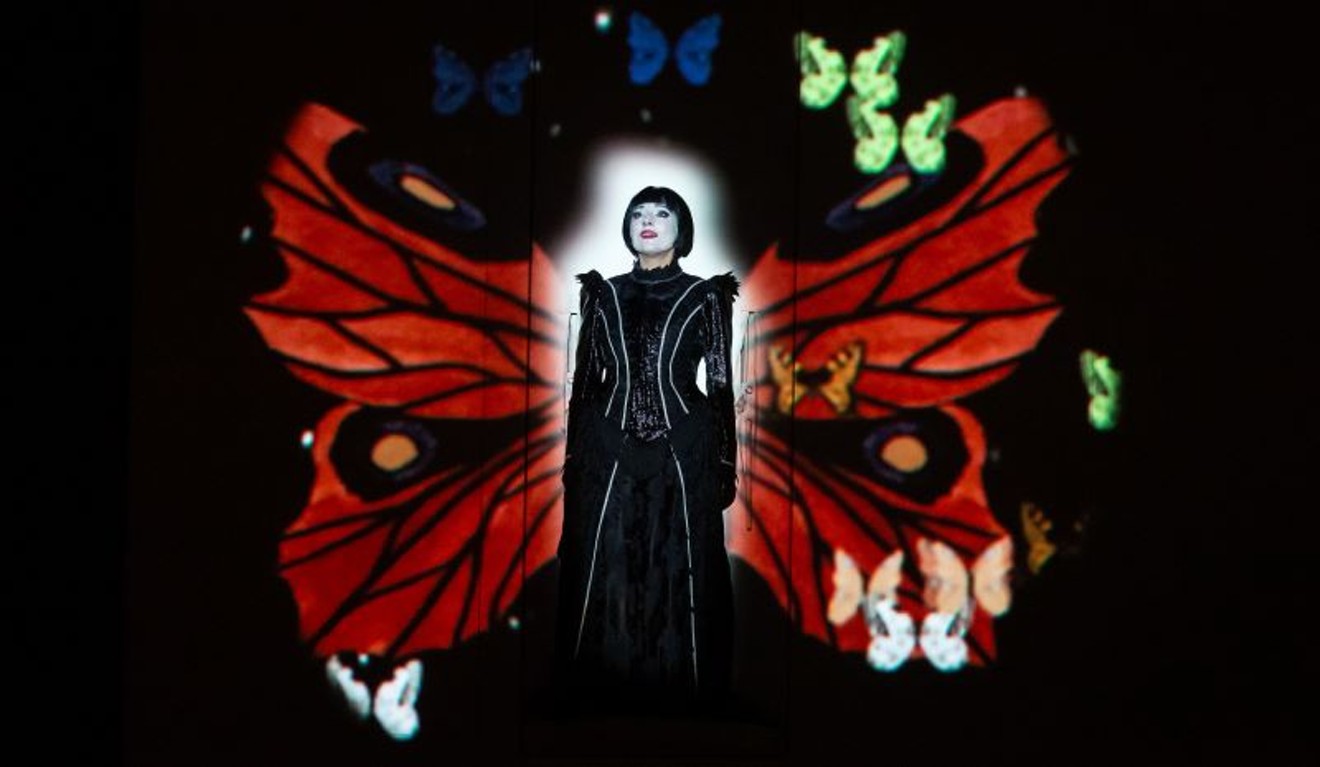Support Us
Houston's independent source of
local news and culture
account
- Welcome,
Insider - Login
- My Account
- My Newsletters
- Contribute
- Contact Us
- Sign out
It's Time For Mozart's The Magic Flute at HGO With, Of Course, The Queen of the Night
Margaret Downing February 2, 2022 4:00AM

A magical story.
Photo by Lynn Lane
[
{
"name": "Related Stories / Support Us Combo",
"component": "11591218",
"insertPoint": "4",
"requiredCountToDisplay": "4"
},{
"name": "Air - Billboard - Inline Content",
"component": "11591214",
"insertPoint": "2/3",
"requiredCountToDisplay": "7"
},{
"name": "R1 - Beta - Mobile Only",
"component": "12287027",
"insertPoint": "8",
"requiredCountToDisplay": "8"
},{
"name": "Air - MediumRectangle - Inline Content - Mobile Display Size 2",
"component": "11591215",
"insertPoint": "12",
"requiredCountToDisplay": "12"
},{
"name": "Air - MediumRectangle - Inline Content - Mobile Display Size 2",
"component": "11591215",
"insertPoint": "4th",
"startingPoint": "16",
"requiredCountToDisplay": "12"
}
]
In recent years, Rainelle Krause has spent much of her time traveling Europe and performing the Queen of the Night role in which she gets to sing lyrics like "Hell's vengeance boils in my heart" a anguished, angry lyric rendered all the more ominous by being delivered in German.
"I've been singing Queen of the Night almost exclusively since 2019," says the rising soprano now calling Fort Worth her home base.
She's making her Houston Grand Opera debut as the mostly villainous/sometimes sympathetic (critics are divided) mother of Princess Pamina in Mozart's classic The Magic Flute. The production by Barrie Kosky and Suzanne Andrade uses silent film-style projections to add to the magical aspects of the good vs. evil story.
Asked why she performs the role so often, Krause quickly quips: "That's what people pay me to sing." Expanding upon that, she says: "Magic Flute is a very popular opera. Audiences love it and because the story is so much like a fairy tale, it gives opera directors a big playground for them to explore in."
Because it is performed so often, Krause says, "It's really important to find people who can reliantly and excitingly sing something with the demands of Queen of the Night." Those challenges and demands include an ability to produce a wide range of notes, especially super high ones.
"The baseline is having comfort and ease in that upper extension. It sits really at the top of the general human vocal range and then within that you need not only obviously to be able to sing it but also bring an intensity and a virility to the role. In order to get that color it tends to be a very specialized thing, very person-specific," Krause says.
In fact, it was the challenge of singing opera that drew Krause to select it for her career. "It seemed like the most difficult thing I could do with my voice. Which means it's more rewarding when you finally achieve it." And it offered, as she puts it, not just standing and singing but acting as well.
As the story goes, Prince Tamino (tenor Norman Reinhardt) is sent to rescue Pamina (soprano Andrea Carroll) by the Queen of the Night from Sarastro (bass Anthony Robin Schneider), who is described as an evil demon. He is accompanied by Papageno (baritone Thomas Glass), a bird catcher. Once the pair have caught up with Pamina, they discover that Sarastro is not quite as he has been portrayed to them. What follows are a series of tests the two would-be rescuers must undergo as well as love found, thwarted, and then rediscovered.
Generally celebrated as optimal Mozart, The Magic Flute is not without its problems in the libretto by Emanuel Schikaneder — namely a main course of racism with a pretty hefty dose of sexism on the side. The only Black character, Monostatos, is seen as a wicked, violent man who lusts after Pamina. The libretto has him specifically referring to his race, saying "a black man is ugly" and that "white is beautiful." As a Black man he should not be aspiring to a white woman, the text makes clear.
As for the sexism, beyond the fact that Pamina is pretty much a passive object waiting to be rescued by a man, there is Sarastro's comment to her that her mother the Queen is too headstrong and Pamina must be guided by a man instead. Elsewhere, Tamino and Papageno are warned by priests of the "wiles of women" and urged to discount anything they say.
"The racism is the huge [problem] if you look at the libretto," says Krause. "There’s a lot of very racist dialog that opera companies are having to contend with. Either they'll sometimes change the libretto or more often they will find another way of changing the character to spin the libretto into something that is not about skin color but is about something else.
"Also, sexism — rampant through the opera. But I think it's a real chance to start a dialog and look a little bit under the surface too," she says. "The libretto is unquestionably very sexist. But if you look at the way Mozart layers the libretto on top of his music, there's a lot of juxtaposition there. And I think he was saying a lot against this broad, blatant text and bringing a lot of nuance and incisive commentary though the music. It's the kind of opera that if you go to it and you don't know anything about it, it's a fun ride. And the more you dig into it, it becomes more and more satisfying.
Krause went to college for music at Indiana University, with no Plan B if singing didn't work out. "But in the years I was auditioning and not getting very much work I picked up aerial arts. So I'm also an aerialist. As the years went by and I really played with putting those two art forms together. I have a number of aerial and singing acts that I do."
Here's a chance to see her combining those talents in a circus and opera collaboration:
As it turned out, the pandemic wasn't a disaster for Krause.
"I had my most productive year of work in 2020, traveling between Denmark and Switzerland and Germany, sort of working when and as I could in between lockdowns. and various restrictions for theaters," says Krause.
She's done this production before and thinks it is very special.
"This particular production is visually stunning. In Copenhagen I did the same production; I was double cast so I got to sit in the audience and really see the whole picture of what's going on. I think for the audience it's really just fascinating because you're dealing not only with projections but live projection. So there's a really delicate dance between the animation, the conductor and the orchestra and the singers and their movements on stage, the way that they're interacting live with all this animation is always slightly different and I think there's a real interesting energy to it."
As a result, she says, "This whole fairy tale aspect of Magic Flute has way more chance to dig into the fantastical elements."
The Magic Flute has remained so popular because the music is so catchy, Krause says. "The music is quintessential late Mozart. It's him at the height of his musical powers. There are so many musical styles going on in Flute. There's something for everybody. And there's a number of overarching universal themes the same way you find in many great works of art, they continue to ring true during the years.
"It’s a great opera. It has its problems but I think it's interesting to engage with those problems for the sake of this music that continues to speak to us hundreds of years later."
Performances are scheduled for February 4-13 at 7:30 p.m. Tuesday, Thursday, Friday and Saturday; and 2 p.m. Sundays at the Wortham Center, 501 Texas. Masks covering nose and mouth are required. For more information, call 713-228-6737 or visit houstongrandopera.org. $20-$210.
KEEP THE HOUSTON PRESS FREE...
Since we started the Houston Press, it has been defined as the free, independent voice of Houston, and we'd like to keep it that way. With local media under siege, it's more important than ever for us to rally support behind funding our local journalism. You can help by participating in our "I Support" program, allowing us to keep offering readers access to our incisive coverage of local news, food and culture with no paywalls.
Margaret Downing is the editor-in-chief who oversees the Houston Press newsroom and its online publication. She frequently writes on a wide range of subjects.
Contact:
Margaret Downing
Follow:
Facebook:
HoustonPress
Twitter:
@HoustonPress
Trending Arts & Culture
- The Story Stalls But The Beat Goes On in The Cher Show at TUTS
- Top 5 Sickest Stephen King Sex Scenes (NSFW)
- Desperate Lives Buoyed By Dylan's Songs in Girl From the North Country
-
Sponsored Content From: [%sponsoredBy%]
[%title%]

Don't Miss Out
SIGN UP for the latest
arts & culture
news, free stuff and more!
Become a member to support the independent voice of Houston
and help keep the future of the Houston Press FREE
Use of this website constitutes acceptance of our
terms of use,
our cookies policy, and our
privacy policy
The Houston Press may earn a portion of sales from products & services purchased through links on our site from our
affiliate partners.
©2024
Houston Press, LP. All rights reserved.





